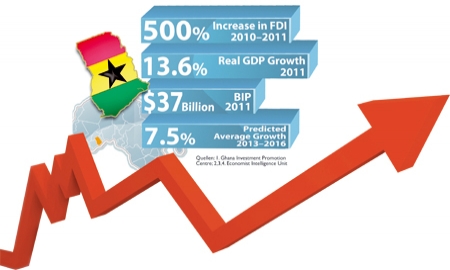Perhaps the most significant aspect of the President Nana Akufo Addo- led administration’s agenda is, economic growth.
Prior to the elections, it had become the single most discussed issue on the Presidential campaigns and greatly influenced the choices of the electorates and subsequently the outcome of the country’s December 2016 polls.
Ghana’s economy, had alongside some of its West African counterparts like Nigeria been hit by the sharp fall in global crude oil prices brought about by the return of the United States of America as a producer and exporter of the commodity.
In fact, one could easily say that but for complementary export earners like gold and cocoa, Ghana would have equally drifted into a total recession.
From a nearly two decade highest of 13.5% by the close of July 2014, Ghana’s annual economic growth referred to as its Gross Domestic Product (GDP) dropped to 3.6% by July 2015 and stayed around that figure till the end of that year and far underperformed against projections made by the country’s economic growth authorities around the globe.
Now after a 4% average economic growth as at 2016 with 4.4% by the end of first quarter of that year, Ghana recorded a whopping 50% increase on its growth rate.
The country’s GDP grew from about 4.1% in January 2017 to 6.6% by the end of the first quarter representing in real terms an additional 2.2% from 4.4% GDP recorded during the same period in 2016.
Commenting on the development to members of the press, Deputy Governor at Bank of Ghana noted that: “the development indicated an expansion of the [country’s] economyâ€.
Giving further details about the latest economic growth rate, he stated that current prices for the 2017 first quarter period stood at Ghc44, 731.8 million against Ghc36, 452.2 million during the same period earlier in 2016.
On a sectorial basis, the Agricultural sector of the economy recorded a 14.3, Industrial sector – 26.7% and the highest sectorial growth rate witnessed by the services sector with a staggering 59%.
Despite this boost in economic activities or growth, there is little real difference in the regular lives of the populace: public transportation prices remain relatively higher compared to periods in 2016; food commodities equally on the same page as well as utility tariffs. All of which make this GDP figures nothing but allegories to the ordinary Ghanaian.
Some are even still of the opinion that growths of this sort have zero-effect on their lives and families.
However, this is an obviously welcomed development, especially on the basis that the current administration except for the tax cut measures announced earlier in March during its first and 2017 budget presentation; is yet to fully implements its economic development agenda which includes such programmes as the stimulus package as well as the famous ‘one-district-one-factory’ initiative, which is geared towards massive job creation and a subsequent outstanding economic growth, that will affect both GDP figures and the everyday lives of the Ghanaian public.





